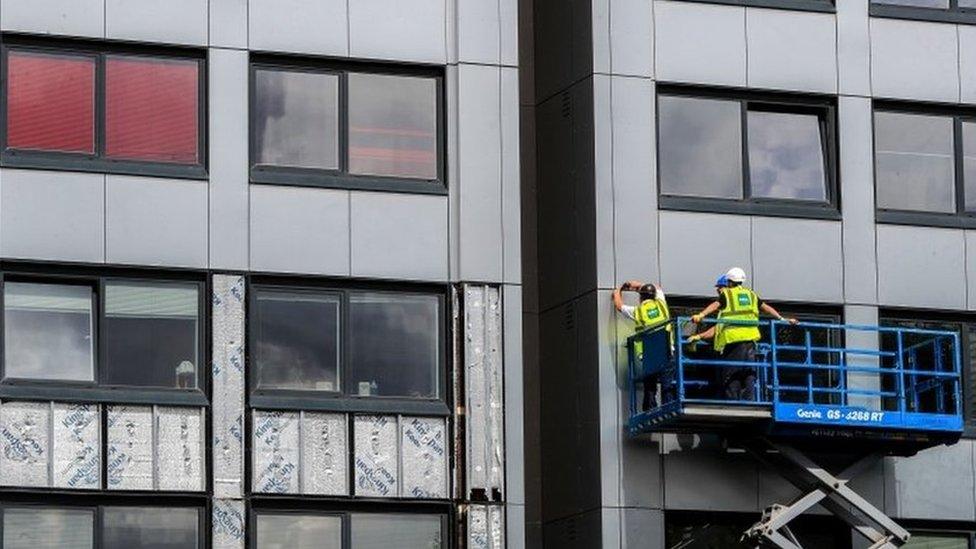No guarantees for leaseholders over cladding removal costs
- Published

Ministers have said they cannot rule out leaseholders in England having to meet some of the costs of removing flammable cladding from their homes.
While £1.6bn had been made available, Chris Pincher told MPs the government would not write an "open cheque".
It was up to developers and building owners to "step up" and take primary responsibility for repairs, he added.
MPs say delays to the process and uncertainty over who will pay are causing "unimaginable anxiety".
Raising the issue in the Commons, Labour's Clive Betts said government support was "totally inadequate" given the cost of removal aluminium composite and other dangerous materials could be as much as £15bn.
After the 2017 Grenfell fire, the government pledged safe alternatives to dangerous cladding would be provided on all buildings in England taller than 18 metres by last June.
But a report in September found that only 155 out of 455 high-rise buildings with similar cladding to Grenfell have had it replaced.
To speed up the process, the Commons Housing Committee said the government should foot the bill for the work in the short term, looking to recover costs from those responsible for historic construction failures at a later date.
'Good faith'
Mr Betts, the committee's chair, said the issue had dragged on for too long and urgent action was needed.
"Leaseholders should not have to pay any of the costs. They bought their properties in good faith, they have not done anything wrong and they should not be financially distressed," he said.
"Without assurances on these points, many people are going to have a very miserable Christmas, trapped in properties they can't sell, often they can't insure...and wondering how on earth they are going to pay for the bills that could arrive on their doormats at any time."
He was backed by Conservative Sir Peter Bottomley, the longest-serving MP in the Commons, who said delays to fixing high-rise and other affected buildings had effectively "frozen" parts of the leasehold property market.
Those affected had been lumbered with "unimaginable anxiety and costs beyond the possible chance of paying".
It has been estimated that replacing unsafe cladding on buildings will cost £4bn in London alone.
'Wrong signal'
Mr Pincher said the government was looking at a range of innovative solutions to help minimise the costs borne by individuals but he said he could not guarantee that all leaseholders would not have to contribute.
"We cannot write an open cheque on behalf of the taxpayer. That would send the wrong signal to developers and those who are responsible for these buildings that they don't have to pay because the taxpayer will.
"I am clear that public funding does not absolve the industry from taking responsibility. We expect investors, developers and building owners who have the means to pay to cover remediation costs themselves."
Ministers have said two new pieces of legislation, the Fire Safety Bill and Building Safety Bill, combined with a separate proposed law on building and fire safety, external - will deliver the biggest changes to building safety for nearly 40 years, ensuring greater accountability in law for the upkeep of buildings and enforcement of safety obligations.
Mr Betts said the proposals were "welcome" but more safeguards were needed, including a central register of building safety managers and more rigorous regulation of construction products.